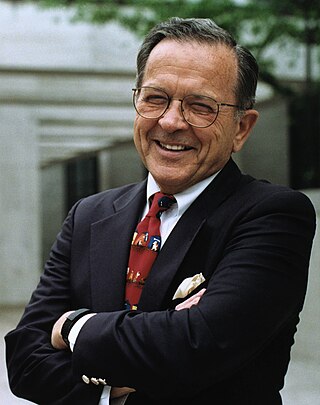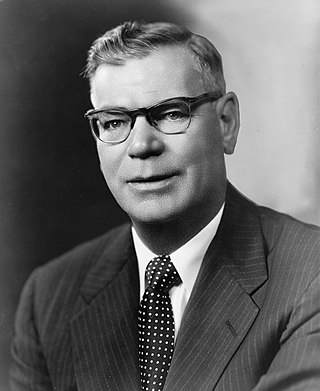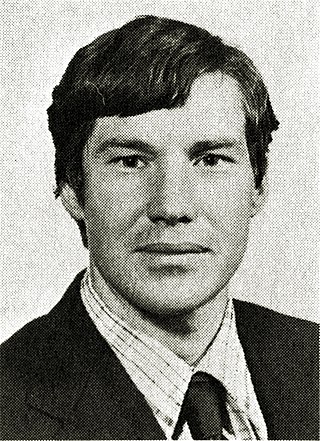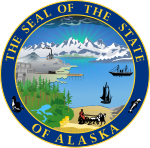
Theodore Fulton Stevens Sr. was an American politician and lawyer who served as a U.S. Senator from Alaska from 1968 to 2009.

Edward Lewis "Bob" Bartlett, was an American politician and a member of the Democratic Party. He served as a U.S. Senator. A key fighter for Alaska statehood, Bartlett served as the Secretary of Alaska Territory from 1939 to 1945, in Congress from 1945 to 1959 as a Delegate, and from 1959 until his death in 1968 as a U.S. senator. He was opposed to U.S. involvement in Vietnam, along with his fellow Senator Ernest Gruening, and also worked to warn people about the dangers of radiation. Many acts bear his name, including a major law known as the Bartlett Act, mandating handicap access in all federally-funded buildings.

Ernest Henry Gruening was an American journalist and politician. A member of the Democratic Party, Gruening was the governor of the Alaska Territory from 1939 until 1953, and a United States Senator from Alaska from 1959 until 1969.

The 1980 United States Senate elections were held on November 4, coinciding with Ronald Reagan's victory in the presidential election. The 34 Senate seats of Class 3 were contested in regular elections. Reagan's large margin of victory over incumbent Jimmy Carter gave a huge boost to Republican Senate candidates, allowing them to flip 12 Democratic seats and win control of the chamber for the first time since the end of the 83rd Congress in January 1955. This was the first time since 1966 that any party successfully defended all their own seats.

The 1970 United States Senate elections was an election for the United States Senate. It took place on November 3, with the 33 seats of Class 1 contested in regular elections. Special elections were also held to fill vacancies. These races occurred in the middle of Richard Nixon's first term as president. The Democrats lost a net of three seats, while the Republicans and the Conservative Party of New York picked up one net seat each, and former Democrat Harry F. Byrd Jr. was re-elected as an independent.

The 1968 United States Senate elections were elections for the United States Senate. Held on November 5, the 34 seats of Class 3 were contested in regular elections. They coincided with the presidential election of the same year. The Republicans picked up five net seats in the Senate. This saw Republicans win a Senate seat in Florida for the first time since Reconstruction.

The 1962 United States Senate elections was an election for the United States Senate. Held on November 6, the 34 seats of Class 3 were contested in regular elections. Special elections were also held to fill vacancies. They occurred in the middle of President John F. Kennedy's term. His Democratic Party made a net gain of four seats from the Republicans, increasing their control of the Senate to 68–32. However, this was reduced to 67–33 between the election and the next Congress, as on November 18, 1962, Democrat Dennis Chávez, who was not up for election that year, died. He was replaced on November 30, 1962, by Republican appointee Edwin L. Mechem. Additionally, Democrat Strom Thurmond became a Republican in 1964, further reducing Democrats to 66–34. This was the first time since 1932 that Democrats gained seats in this class of Senators.

The 1958 United States Senate elections were elections for the United States Senate which occurred in the middle of President Dwight D. Eisenhower's second term. Thirty-two seats of Class 1 were contested in regular elections, the new state of Alaska held its first Senate elections for its Class 2 and 3 seats, and two special elections were held to fill vacancies.

Clark S. Gruening is an attorney and Democratic Party politician from the U.S. state of Alaska. He is chiefly known as the second of three persons to defeat the incumbent holder of Alaska's Class 3 United States Senate seat in the primary election.

The 2008 United States Senate election in Alaska was held on November 4, 2008. Incumbent Republican U.S. Senator and former President pro tempore Ted Stevens ran for re-election for an eighth term in the United States Senate. It was one of the ten Senate races that U.S. Senator John Ensign of Nevada, the chairman of the National Republican Senatorial Committee, predicted as being most competitive. The primaries were held on August 26, 2008. Stevens was challenged by Democratic candidate Mark Begich, the mayor of Anchorage and son of former U.S. Representative Nick Begich.

The 1980 United States Senate election in Alaska was held on November 4, 1980. Incumbent Democratic United States Senator Mike Gravel ran for a third term in the United States Senate, but lost in the Democratic primary to Clark Gruening, a former state representative who was the grandson of Ernest Gruening, whom Gravel had defeated twelve years prior in an election for the same seat. Gruening later went on to lose the general election to Republican nominee Frank Murkowski, a banker.

Electoral history of Mike Gravel, Speaker of the Alaska House of Representatives (1965–1966), United States Senator from Alaska (1969–1981), candidate for the 1972 Democratic Party Vice Presidential nomination and 2008 Democratic and later Libertarian Presidential nomination

Electoral history of Ted Stevens, United States Senator from Alaska (1968–2009), Senate Minority Whip (1977–1981), Acting Senate Minority Leader (1979–1980), Senate Majority Whip (1981–1985), President pro tempore of the United States Senate (2003–2007) and President pro tempore emeritus (2007–2009)

The 1960 United States presidential election in Alaska took place on November 8, 1960, as part of the nationwide presidential election. This was the first presidential election that Alaska participated in. Voters chose three representatives, or electors, to the Electoral College, who voted for president and vice president.

The 1974 United States Senate election in Alaska took place on November 5, 1974. Incumbent Democratic U.S. Senator Mike Gravel was re-elected to a second term in office, defeating Republican State Senator Clyde "C.R." Lewis. This is the last time that a member of the Democratic Party has won the Class 3 Senate seat in Alaska. It is also the last time a person not named Murkowski has won this seat. Democrats did not win another Alaska U.S. Senate race until 2008.

The 1968 United States Senate election in Alaska took place on November 5, 1968. Incumbent Democratic U.S. Senator Ernest Gruening ran for a second full term in office but finished behind Speaker of the Alaska House of Representatives Mike Gravel in the Democratic primary. Gruening launched a write-in bid for the seat in the general election, but finished third to Gravel and Republican former Anchorage mayor Elmer Rasmuson.

The 1978 United States Senate election in Alaska was held on November 7, 1978. Incumbent Republican U.S. Senator Ted Stevens was re-elected to a third term in office, defeating Democrat Donald Hobbs.

The 1970 United States Senate special election in Alaska was held on November 3, 1970, to fill a seat in the United States Senate following the December 1968 death of Democrat Bob Bartlett, who had been Alaska's senior Senator since statehood in 1959. Republican Ted Stevens was appointed to the seat temporarily on December 24, 1968, to serve until the election could be held.

The 1966 United States Senate election in Alaska was held on November 8, 1966. Incumbent Democratic U.S. Senator Bob Bartlett was re-elected to a third term in office in a landslide, defeating Republican dentist Lee McKinley in a rematch of their 1960 race. Bartlett would not complete the term, dying in office on December 11, 1968, following complications after heart surgery. Ted Stevens would be elected to complete Bartlett's term, and would serve for 40 years in the U.S. Senate. This was the last time until 2008 that a Democrat was elected to Alaska's Class 2 Senate seat.

The 1958 United States Senate elections in Alaska were held November 25, 1958. The elections were held in anticipation of Alaska's admission as the forty-ninth state in the union, effective January 3, 1959. The state held two simultaneous elections to determine their first senators.

























